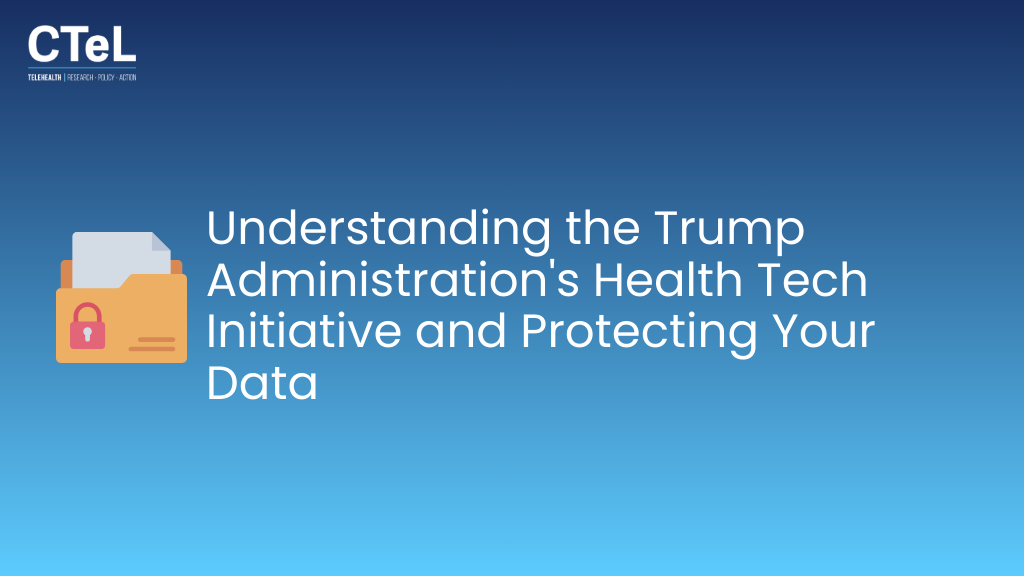Understanding the Trump Administration's Health Tech Initiative and Protecting Your Data
The recent announcement by the Trump administration to launch a new private health tracking system in collaboration with major technology companies and healthcare giants marks a significant stride towards a more interconnected digital health ecosystem. While proponents champion this initiative as a critical upgrade for America's healthcare networks, promising easier access to health records and enhanced wellness monitoring, it simultaneously ushers in a new era of complex considerations, particularly concerning data privacy and security. Those who utilize digital health technology, from individual consumers to large health systems, must understand the multifaceted implications to navigate this evolving landscape effectively and protect their sensitive health information.
The Promise and Peril of Seamless Health Data Exchange
The core of the administration's "Making Health Technology Great Again" initiative is to foster a seamless exchange of personal health data and medical records across disparate health systems and applications (Seitz, 2025). This voluntary program, spearheaded by the Centers for Medicare and Medicaid Services (CMS) and backed by over 60 companies including Google, Amazon, and Apple, aims to digitize and unify fragmented patient information. Key focus areas include diabetes and weight management, the use of conversational AI for patient assistance, and digital tools for streamlined check-ins and medication tracking (CMS, 2025). The vision is a future where patients can effortlessly access their own records, and healthcare providers have a holistic view of patient health, theoretically leading to more accurate diagnoses and personalized care (Mihaljevic, as cited in Seitz, 2025).
President Donald Trump launches an initiative encouraging Americans to upload personal health data and medical records to apps and systems run by Big Tech. “Today the dream of easily transportable electronic medical records finally becomes a reality,” he said. Source: AP News
However, this ambitious undertaking is not without its significant risks. Digital privacy advocates have voiced strong skepticism regarding the security and appropriate use of this highly sensitive data. Concerns revolve around the potential for "further use and monetization of sensitive and personal health information" by private entities, many of whom may not be subject to the same stringent privacy regulations as traditional healthcare providers under the Health Insurance Portability and Accountability Act (HIPAA) (Chester, as cited in Seitz, 2025). The convenience of integrated health data could clash head-on with an individual's expectation of privacy, creating an ethical and legal minefield (Gostin, as cited in Seitz, 2025).
Key Data Considerations for Digital Health Users
For individuals engaging with digital health technology, understanding the nuances of data privacy is paramount. While the system is touted as "opt-in," users must be acutely aware of what they are consenting to when sharing their health data with various apps and platforms.
Beyond HIPAA: Many consumer-facing health apps and wearable devices are not covered by HIPAA. This means that data collected by these entities may be shared, sold, or utilized for purposes beyond direct healthcare, such as targeted advertising, without the same level of legal protection as data held by hospitals or doctors' offices (Crawford, as cited in Fierce Healthcare, 2025). This is a critical point often overlooked by consumers eager for convenience.
Data Aggregation and Inferences: The initiative facilitates the aggregation of diverse data points – from lab results to daily step counts and dietary habits. While this offers a comprehensive health picture for providers, it also enables companies to create highly detailed profiles of individuals, potentially making inferences about health conditions or lifestyle choices that could be used in unexpected ways.
Security Vulnerabilities: The sheer volume and sensitivity of the data being shared across numerous platforms increase the attack surface for cyber threats. Despite assurances of security, the risk of data breaches, unauthorized access, and misuse remains a significant concern.
Implications for the Direct-to-Consumer Space and Healthcare Stakeholders
The expansion of this digital health ecosystem has profound implications across the healthcare spectrum:
Telehealth DTC Companies & Innovators: This initiative presents immense opportunities for direct-to-consumer (DTC) telehealth companies and innovators. Access to a wider array of patient data can fuel the development of more personalized and effective digital health solutions, from AI-driven wellness programs to remote monitoring tools. However, these entities must prioritize robust data governance frameworks, transparent privacy policies, and clear communication with users about data handling to build trust and ensure ethical practices (Fierce Healthcare, 2025). Overlooking the public's growing privacy concerns could severely impact adoption and reputation.
Health Systems and Providers: For traditional health systems and providers, the initiative promises to "kill the clipboard" by enabling seamless digital check-ins and reducing administrative burden (Fierce Healthcare, 2025). It also offers a more complete patient history, potentially improving diagnostic accuracy and treatment planning. However, they must ensure their internal systems are secure and interoperable, and that their staff are well-trained in managing and protecting patient data in this new connected environment. The responsibility for data protection extends beyond their immediate purview when data is shared with third-party tech companies.
Patients: While patients stand to gain from easier access to their health records and personalized wellness tools, they are also at the highest risk if data privacy is compromised. They must be empowered with clear, understandable information about how their data is being used and have effective mechanisms to control its sharing.
Protecting Yourself Through CTeL Membership and Network
In this complex and rapidly evolving digital health landscape, organizations like the Center for Telehealth and eHealth Law(CTeL) play a vital role in safeguarding consumer interests and promoting responsible innovation. CTeL, through its membership and network, offers a crucial avenue for protection and advocacy:
Advocacy and Policy Influence: CTeL actively engages with policymakers to shape regulations that prioritize consumer data privacy and security in digital health. Membership provides a collective voice to advocate for stronger safeguards and accountability mechanisms for all entities handling health data, including those not traditionally covered by HIPAA.
Best Practices and Ethical Guidelines: CTeL develops and promotes industry best practices and ethical guidelines for digital health technology. This includes recommendations for data anonymization, secure data storage, transparent consent processes, and responsible AI development. Adhering to these guidelines, facilitated through CTeL's network, helps mitigate risks and fosters trust.
Consumer Education and Empowerment: A key function of CTeL is to educate the public about their rights regarding health data, potential risks, and practical steps they can take to protect their privacy. This includes providing resources on how to review privacy policies, understand data sharing agreements, and exercise control over their digital health footprint.
Networking and Collaboration: For health systems, providers, DTC companies, and innovators, CTeL's network offers a platform for collaboration, sharing insights, and developing solutions to common challenges in digital health. This collaborative environment fosters a shared commitment to ethical innovation and patient-centric care.
By staying informed, critically evaluating digital health services, and supporting organizations like CTeL, individuals and stakeholders can collectively work towards a future where digital health truly empowers patients while robustly protecting their most sensitive information.
References
CMS. (2025, July 30). White House, Tech Leaders Commit to Create Patient-Centric Healthcare Ecosystem. Retrieved from https://www.cms.gov/newsroom/press-releases/white-house-tech-leaders-commit-create-patient-centric-healthcare-ecosystem
Fierce Healthcare. (2025, July 30). White House and CMS to launch Health Tech Ecosystem Initiative to expand use of digital health with a focus on consumers. Retrieved from https://www.fiercehealthcare.com/regulatory/white-house-and-cms-launch-health-tech-ecosystem-initiative-expand-use-digital-health
Seitz, A. (2025, July 30). Trump administration is launching a new private health tracking system with Big Tech's help. AP News. Retrieved from https://apnews.com/article/trump-ai-rfk-jr-health-tech-fa73703bd1fd557c787ef0b590e151f1




